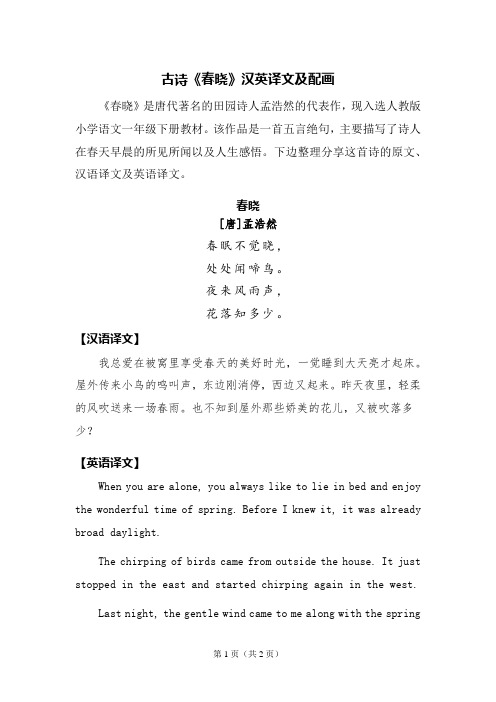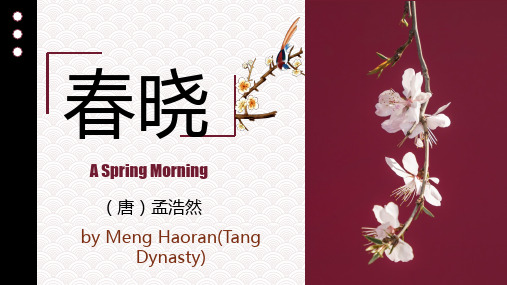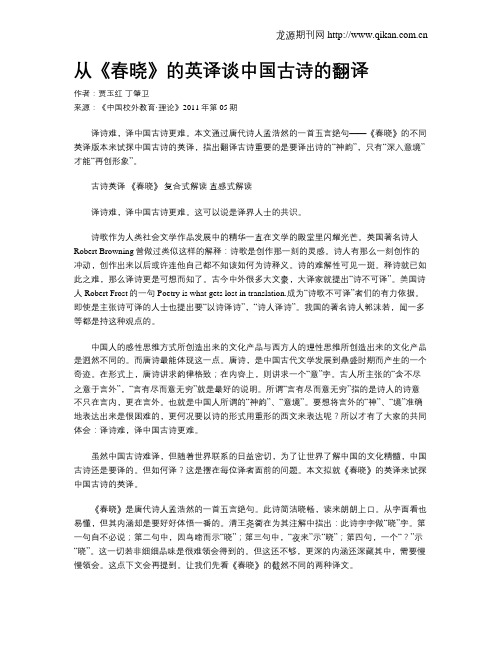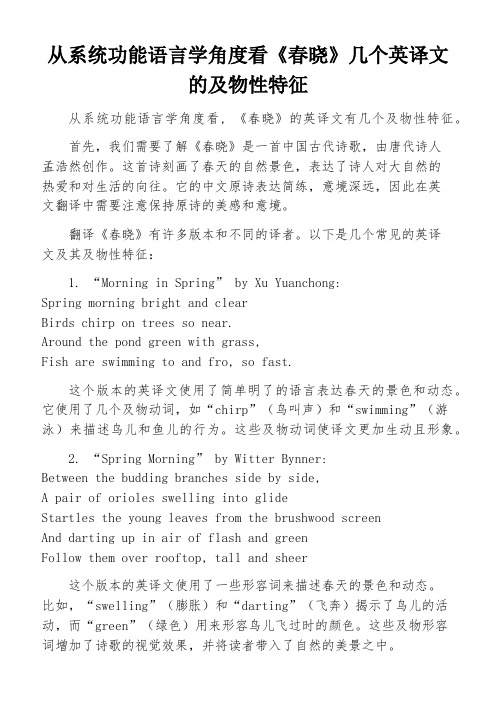从《春晓》的英译谈中国古诗的翻译
春晓古诗英文诗配画

古诗《春晓》汉英译文及配画
《春晓》是唐代著名的田园诗人孟浩然的代表作,现入选人教版小学语文一年级下册教材。
该作品是一首五言绝句,主要描写了诗人在春天早晨的所见所闻以及人生感悟。
下边整理分享这首诗的原文、汉语译文及英语译文。
春晓
[唐]孟浩然
春眠不觉晓,
处处闻啼鸟。
夜来风雨声,
花落知多少。
【汉语译文】
我总爱在被窝里享受春天的美好时光,一觉睡到大天亮才起床。
屋外传来小鸟的鸣叫声,东边刚消停,西边又起来。
昨天夜里,轻柔的风吹送来一场春雨。
也不知到屋外那些娇美的花儿,又被吹落多少?
【英语译文】
When you are alone, you always like to lie in bed and enjoy the wonderful time of spring.Before I knew it, it was already broad daylight.
The chirping of birds came from outside the house. It just stopped in the east and started chirping again in the west.
Last night, the gentle wind came to me along with the spring
drizzle.
How many of those beautiful flowers on the big trees have been blown down?
【古诗配画】。
唐诗《春晓》的22种英译

唐诗《春晓》的22种英译【春眠不觉晓,处处闻啼鸟。
夜来风雨声,花落知多少。
】(唐孟浩然《春晓》)①I awake light-hearted this morning of spring. / Everywhere round me the singing of birds –/ But now I remember the night, the storm, / And I wonder how many blossoms were broken. (Witter Bynner & Kiang Kang-hu) ②Into my slumber in spring steal beams of morning, / and now to my ears come the voices of birds all around. / Yet I heard the sounds of winds and rains in the night, / I wonder how many flowers are fallen down to the ground. (万昌盛王僴中)③Oversleeping in spring I missed the dawn; / Now everywhere the cries of birds are heard. / Tumult of wind and rain had filled the night — / How many blossoms fell during the storm? (张廷琛& Bruce M. Wilson)④O’er spring drowse, lo! The morning dawns, / And everywhere b irds’ songs call. / It rained last night, and winds rustled so — / Plenty, me thinks, the blossoms’ fall. (林同济)⑤ Slumbering, I know not the spring dawn is peeping, / But everywhere the singing birds are cheeping. / Last night I heard the rain dripping and wind weeping, / how many petals are now on the ground sleeping? (吴钧陶)⑥Spring slumber slips by till daybreak, / Around me the birds are chirping awake. / Now I recall last night the wind and the rain, / And wonder how many petals have fallen. (刘军平)⑦Unconscious of dawning in the spring, / I hear birds crying all around. / There was sound of wind and rain all night; / How many flowers have fallen aground? (赵甄陶)⑧I wake to find the spring morn bright, / And hear birds singing all around. / Wind and rain was heavy last night, / How many flowers fell aground? (杨纪鹤)⑨This morn of spring in bed I’m lying, not to awake till birds are crying. After one night of wind and showers, how many are the fallen flowers! (许渊冲)⑩I slept in spring, unconscious of the dawn, / When songs of birds were heard on every lawn; / At night came sounds of rain and wind that blew, / How many a blossom fell no one knew!(许渊冲)⑪In springtide’s dreams the dawn is sweetly drowned; / Till everywhere the songs of birds resound. / I heard last night the rush of wind and rain. / How many flowers have fallen to the ground? (许渊冲)⑫Late! This spring morning as I awake I know. / All around me the birds are crying. The storm / last night, I sensed its fury, How many, / I wonder, are fallen, poor dear flowers!(翁显良)⑬I scarcely knew it was dawn, So sound was the sleep of spring; / Everywhere there was birdsong. / All night long was the sough of wind and rain; / How many flowers have fallen to the ground? (翁显良)⑭How suddenly the morning comes in spring! / On every side you hear the sweet birds sing: / Last night amidst the storm —Ah, who can tell, / With wind and rain, how many blossoms fell? (翁显良)⑮Sleeping in the spring, one hardly knows it’s daylight, / Birds are heard everywhere trilling. /There’ve been sounds of wind and rain in the night, / How many blossoms have been falling? (翁显良)⑯I slept in spring not conscious of the dawn, / But heard the gay birds chattering all round, / I remember, there was a storm at night. / Pray, how many blossoms have fallen down? (翁显良)⑰Sleeping in spring oblivious of dawn / everywhere I hear birds / after the wind and rain last night / I wonder how many petals fell (Red Pine) ⑱Asleep in the spring, dawn comes to me unawares; / I hear the birds singing all round. / When night comes there’s the sound of wind and rain; / Who knows how many blossoms fall to the ground. (Peter Harris)⑲I scarcely knew it was dawn, / So round was the sleep of spring; / Everywhere there was birdsong. / All night long was the sough of wind and rain; / How many flowers have fallen to the ground? (刘师舜1967)⑳How suddenly the morning comes in Spring! / On every side you hear the sweet birds sing. / Last night amidst the storm – Ah, who can tell, / With wind and rain, how many blossoms fell? (DAWN IN SPRING John Turner) 21.In drowsy spring I slept till daybreak / When the birds cry here and there, I awake. / Last night I heard a storm of wind and rain, / How many blossoms have fallen again? (《中国翻译》杂志2001年第2期)22. This spring morning in bed I’m lying / Not awake till I hear birds crying. / After one night of wind and showers / How many are the fallen flowers? (《中国翻译》杂志2001年第2期)注:这是本人正在编著的《汉英翻译大辞典》中的一个词条。
唐诗《春晓》的22种英译

唐诗《春晓》的22种英译【春眠不觉晓,处处闻啼鸟。
夜来风雨声,花落知多少。
】(唐孟浩然《春晓》)①I awake light-hearted this morning of spring. / Everywhere round me the singing of birds –/ But now I remember the night, the storm, / And I wonder how many blossoms were broken. (Witter Bynner & Kiang Kang-hu) ②Into my slumber in spring steal beams of morning, / and now to my ears come the voices of birds all around. / Yet I heard the sounds of winds and rains in the night, / I wonder how many flowers are fallen down to the ground. (万昌盛王僴中)③Oversleeping in spring I missed the dawn; / Now everywhere the cries of birds are heard. / Tumult of wind and rain had filled the night — / How many blossoms fell during the storm? (张廷琛& Bruce M. Wilson)④O’er spring drowse, lo! The morning dawns, / And everywhere b irds’ songs call. / It rained last night, and winds rustled so — / Plenty, me thinks, the blossoms’ fall. (林同济)⑤ Slumbering, I know not the spring dawn is peeping, / But everywhere the singing birds are cheeping. / Last night I heard the rain dripping and wind weeping, / how many petals are now on the ground sleeping? (吴钧陶)⑥Spring slumber slips by till daybreak, / Around me the birds are chirping awake. / Now I recall last night the wind and the rain, / And wonder how many petals have fallen. (刘军平)⑦Unconscious of dawning in the spring, / I hear birds crying all around. / There was sound of wind and rain all night; / How many flowers have fallen aground? (赵甄陶)⑧I wake to find the spring morn bright, / And hear birds singing all around. / Wind and rain was heavy last night, / How many flowers fell aground? (杨纪鹤)⑨This morn of spring in bed I’m lying, not to awake till birds are crying. After one night of wind and showers, how many are the fallen flowers! (许渊冲)⑩I slept in spring, unconscious of the dawn, / When songs of birds were heard on every lawn; / At night came sounds of rain and wind that blew, / How many a blossom fell no one knew!(许渊冲)⑪In springtide’s dreams the dawn is sweetly drowned; / Till everywhere the songs of birds resound. / I heard last night the rush of wind and rain. / How many flowers have fallen to the ground? (许渊冲)⑫Late! This spring morning as I awake I know. / All around me the birds are crying. The storm / last night, I sensed its fury, How many, / I wonder, are fallen, poor dear flowers!(翁显良)⑬I scarcely knew it was dawn, So sound was the sleep of spring; / Everywhere there was birdsong. / All night long was the sough of wind and rain; / How many flowers have fallen to the ground? (翁显良)⑭How suddenly the morning comes in spring! / On every side you hear the sweet birds sing: / Last night amidst the storm —Ah, who can tell, / With wind and rain, how many blossoms fell? (翁显良)⑮Sleeping in the spring, one hardly knows it’s daylight, / Birds are heard everywhere trilling. /There’ve been sounds of wind and rain in the night, / How many blossoms have been falling? (翁显良)⑯I slept in spring not conscious of the dawn, / But heard the gay birds chattering all round, / I remember, there was a storm at night. / Pray, how many blossoms have fallen down? (翁显良)⑰Sleeping in spring oblivious of dawn / everywhere I hear birds / after the wind and rain last night / I wonder how many petals fell (Red Pine) ⑱Asleep in the spring, dawn comes to me unawares; / I hear the birds singing all round. / When night comes there’s the sound of wind and rain; / Who knows how many blossoms fall to the ground. (Peter Harris)⑲I scarcely knew it was dawn, / So round was the sleep of spring; / Everywhere there was birdsong. / All night long was the sough of wind and rain; / How many flowers have fallen to the ground? (刘师舜1967)⑳How suddenly the morning comes in Spring! / On every side you hear the sweet birds sing. / Last night amidst the storm – Ah, who can tell, / With wind and rain, how many blossoms fell? (DAWN IN SPRING John Turner) 21.In drowsy spring I slept till daybreak / When the birds cry here and there, I awake. / Last night I heard a storm of wind and rain, / How many blossoms have fallen again? (《中国翻译》杂志2001年第2期)22. This spring morning in bed I’m lying / Not awake till I hear birds crying. / After one night of wind and showers / How many are the fallen flowers? (《中国翻译》杂志2001年第2期)注:这是本人正在编著的《汉英翻译大辞典》中的一个词条。
小学英语中国古诗赏析ASpringMorning(春晓)

A Spring Morning
(唐)孟浩然 by Meng Haoran(Tang
Dynasty)
Contents
ONE
TWO THREE FOUR
BACKGROUND WORDS
PRACTICE DUBBING
壹 Background
古诗鉴赏
【春晓】
花夜处春 落来处眠 知风闻不 多雨啼觉 少声鸟晓 。,。,
醒来只听到到处有鸟儿啼叫。
awake
/əˈweɪk/
v.醒来
短语:half awake 半梦半醒
例句:The noise kept him awake. 噪音使他一直醒着。
拓展: 第三人称单数 awakes 现在分词 awaking 过去式 awoke或awaked
cry
/kraɪ/
v.哭泣
短语:cry out 大声呼喊
叁 Practice
Fill in blanks.
A Spring Morning This spring morning in bed I’m l ying , Not to awake till the birds are crying .
Fill in blanks.
A Spring Morning After one night of wind and shower , How many are the f allen flowers!
lie
短语:lie down躺下休息
/laɪ/
v.平躺,平卧
例句:He is lying on the bed 他正躺在床上。
(现在分词lying) 拓展:
lie还有撒谎的意思。
Don’t lie to me.不要对我撒谎。
从《春晓》的英译谈中国古诗的翻译

从《春晓》的英译谈中国古诗的翻译作者:贾玉红丁肇卫来源:《中国校外教育·理论》2011年第05期译诗难,译中国古诗更难。
本文通过唐代诗人孟浩然的一首五言绝句——《春晓》的不同英译版本来试探中国古诗的英译,指出翻译古诗重要的是要译出诗的“神韵”,只有“深入意境”才能“再创形象”。
古诗英译《春晓》复合式解读直感式解读译诗难,译中国古诗更难。
这可以说是译界人士的共识。
诗歌作为人类社会文学作品发展中的精华一直在文学的殿堂里闪耀光芒。
英国著名诗人Robert Browning曾做过类似这样的解释:诗歌是创作那一刻的灵感。
诗人有那么一刻创作的冲动,创作出来以后或许连他自己都不知该如何为诗释义。
诗的难解性可见一斑。
释诗就已如此之难,那么译诗更是可想而知了。
古今中外很多大文豪,大译家就提出“诗不可译”。
美国诗人Robert Frost的一句Poetry is what gets lost in translation.成为“诗歌不可译”者们的有力依据。
即使是主张诗可译的人士也提出要“以诗译诗”,“诗人译诗”。
我国的著名诗人郭沫若,闻一多等都是持这种观点的。
中国人的感性思维方式所创造出来的文化产品与西方人的理性思维所创造出来的文化产品是迥然不同的。
而唐诗最能体现这一点。
唐诗,是中国古代文学发展到鼎盛时期而产生的一个奇迹。
在形式上,唐诗讲求韵律格致;在内容上,则讲求一个“意”字。
古人所主张的“含不尽之意于言外”,“言有尽而意无穷”就是最好的说明。
所谓“言有尽而意无穷”指的是诗人的诗意不只在言内,更在言外。
也就是中国人所谓的“神韵”、“意境”。
要想将言外的“神”、“境”准确地表达出来是很困难的,更何况要以诗的形式用重形的西文来表达呢?所以才有了大家的共同体会:译诗难,译中国古诗更难。
虽然中国古诗难译,但随着世界联系的日益密切,为了让世界了解中国的文化精髓,中国古诗还是要译的。
但如何译?这是摆在每位译者面前的问题。
从《春晓》的英译谈中国古诗的翻译

《从《春晓》的英译谈中国古诗的翻译.doc》译诗难,译中国古诗更难。
本文通过唐代诗人孟浩然的一首五言绝句《春晓》的不同英译...将本文的Word文档下载,方便收藏和打印推荐度:点击下载文档https://m./wenxue/menghaoran/327719.html下载说明:1. 下载的文档为doc格式,下载后可用word文档或者wps打开进行编辑;2. 若打开文档排版布局出现错乱,请安装最新版本的word/wps 软件;3. 下载时请不要更换浏览器或者清理浏览器缓存,否则会导致无法下载成功;4. 网页上所展示的文章内容和下载后的文档内容是保持一致的,下载前请确认当前文章内容是您所想要下载的内容。
付费下载付费后无需验证码即可下载限时特价:6.00元/篇原价20元免费下载仅需3秒1、微信搜索关注公众号:copy839点击复制2、进入公众号免费获取验证码3、将验证码输入下方框内,确认即可复制联系客服微信支付中,请勿关闭窗口微信支付中,请勿关闭窗口×温馨提示支付成功,请下载文档我知道了咨询客服×常见问题•1、支付成功后,为何无法下载文档?付费后下载不了,请核对下微信账单信息,确保付费成功;已付费成功了还是下载不了,有可能是浏览器兼容性问题。
•2、付费后能否更换浏览器或者清理浏览器缓存后下载?更换浏览器或者清理浏览器缓存会导致下载不成功,请不要更换浏览器和清理浏览器缓存。
•3、如何联系客服?扫描下方二维码关注公众号“网站在线小助理”,及时联系客服解决。
请把【付款记录详情】截图给客服,同时把您购买的文章【网址】发给客服。
客服会在24小时内把文档发送给您。
(客服在线时间为周一至周五9:00-12:30 14:00-18:30)。
从系统功能语言学角度看《春晓》几个英译文的及物性特征

从系统功能语言学角度看《春晓》几个英译文的及物性特征从系统功能语言学角度看, 《春晓》的英译文有几个及物性特征。
首先,我们需要了解《春晓》是一首中国古代诗歌,由唐代诗人孟浩然创作。
这首诗刻画了春天的自然景色,表达了诗人对大自然的热爱和对生活的向往。
它的中文原诗表达简练,意境深远,因此在英文翻译中需要注意保持原诗的美感和意境。
翻译《春晓》有许多版本和不同的译者。
以下是几个常见的英译文及其及物性特征:1. “Morning in Spring” by Xu Yuanchong:Spring morning bright and clearBirds chirp on trees so near.Around the pond green with grass,Fish are swimming to and fro, so fast.这个版本的英译文使用了简单明了的语言表达春天的景色和动态。
它使用了几个及物动词,如“chirp”(鸟叫声)和“swimming”(游泳)来描述鸟儿和鱼儿的行为。
这些及物动词使译文更加生动且形象。
2. “Spring Morning” by Witter Bynner:Between the budding branches side by side,A pair of orioles swelling into glideStartles the young leaves from the brushwood screenAnd darting up in air of flash and greenFollow them over rooftop, tall and sheer这个版本的英译文使用了一些形容词来描述春天的景色和动态。
比如,“swelling”(膨胀)和“darting”(飞奔)揭示了鸟儿的活动,而“green”(绿色)用来形容鸟儿飞过时的颜色。
这些及物形容词增加了诗歌的视觉效果,并将读者带入了自然的美景之中。
春晓的古诗英语赏析

春晓的古诗英语赏析Spring Morning Ancient Poem English Appreciation。
Spring Morning is a famous ancient Chinese poem written by Tang Dynasty poet Meng Haoran. It describes the beauty of nature in the early morning of spring, and the sense of peace and tranquility that comes with it. The poem has been widely admired for its simple yet profound depiction of the natural world, and has been translated into many languages, including English.The poem goes like this:春眠不觉晓,。
处处闻啼鸟。
夜来风雨声,。
花落知多少。
In English, it can be translated as:In spring, sleep is not yet awake,。
Everywhere I hear birds singing.During the night, the sound of wind and rain,。
How many flowers have fallen, who knows?The poem captures the essence of spring, with its fresh and vibrant imagery. It is a celebration of the awakening of nature after the long, cold winter, and the joy and beauty that comes with it.The first two lines of the poem describe the speaker's reluctance to wake up from his deep slumber in the early morning of spring. The use of the word "春眠" (spring sleep)creates a sense of laziness and contentment, as if the speaker is reluctant to leave the comfort of his bed. This feeling is further emphasized by the phrase "不觉晓" (not yet awake), which suggests that the speaker is still half-asleep, lost in the dreamy world of spring.The next two lines of the poem introduce the sounds of nature that awaken the speaker from his slumber. The phrase "处处闻啼鸟" (everywhere I hear birds singing) creates a sense of the surrounding nature coming to life, as the birds chirp and sing in the early morning. This line evokes a sense of joy and excitement, as the speaker is greeted by the cheerful melodies of the birds.The last two lines of the poem introduce a contrast to the joyful scene of spring awakening. The phrase "夜来风雨声" (during the night, the sound of wind and rain) suggests that the speaker has been disturbed by the sounds of the night, which may have been harsh and unsettling. This line introduces a sense of contrast to the peaceful and joyful scene of spring awakening, as it reminds the reader that nature is not always gentle and serene.The final line of the poem, "花落知多少" (how many flowers have fallen, who knows?), introduces a sense of melancholy and reflection. It suggests that the beauty of spring is fleeting and transient, as the flowers that bloom will eventually wither and fall. This line serves as a reminder of the impermanence of life and the beauty of nature, and adds a layer of depth and complexity to the poem.The poem Spring Morning is a timeless classic that continues to resonate with readers today. Its simple yet profound depiction of the beauty of spring and the transient nature of life has made it a beloved and enduring piece of literature. The poem's themes of nature, beauty, and impermanence are universal and timeless, and continue to inspire and move readers across cultures and generations.In conclusion, Spring Morning is a masterpiece of ancient Chinese poetry that captures the beauty and essence of spring. Its simple yet profound imagery and themes ofnature, beauty, and impermanence continue to resonate with readers today, making it a timeless classic that will continue to be admired and appreciated for generations to come.。
- 1、下载文档前请自行甄别文档内容的完整性,平台不提供额外的编辑、内容补充、找答案等附加服务。
- 2、"仅部分预览"的文档,不可在线预览部分如存在完整性等问题,可反馈申请退款(可完整预览的文档不适用该条件!)。
- 3、如文档侵犯您的权益,请联系客服反馈,我们会尽快为您处理(人工客服工作时间:9:00-18:30)。
从《春晓》的英译谈中国古诗的翻译
译诗难,译中国古诗更难。
本文通过唐代诗人孟浩然的一首五言绝句——《春晓》的不同英译版本来试探中国古诗的英译,指出翻译古诗重要的是要译出诗的“神韵”,只有“深入意境”才能“再创形象”。
古诗英译《春晓》复合式解读直感式解读
译诗难,译中国古诗更难。
这可以说是译界人士的共识。
诗歌作为人类社会文学作品发展中的精华一直在文学的殿堂里闪耀光芒。
英国著名诗人Robert Browning曾做过类似这样的解释:诗歌是创作那一刻的灵感。
诗人有那么一刻创作的冲动,创作出来以后或许连他自己都不知该如何为诗释义。
诗的难解性可见一斑。
释诗就已如此之难,那么译诗更是可想而知了。
古今中外很多大文豪,大译家就提出“诗不可译”。
美国诗人Robert Frost的一句Poetry is what gets lost in translation.成为“诗歌不可译”者们的有力依据。
即使是主张诗可译的人士也提出要“以诗译诗”,“诗人译诗”。
我国的著名诗人郭沫若,闻一多等都是持这种观点的。
中国人的感性思维方式所创造出来的文化产品与西方人的理性思维所创造出来的文化产品是迥然不同的。
而唐诗最能体现这一点。
唐诗,是中国古代文学发展到鼎盛时期而产生的一个奇迹。
在形式上,唐诗讲求韵律格致;在内容上,则讲求一个“意”字。
古人所主张的“含不尽之意于言外”,“言有尽而意无穷”就是最好的说明。
所谓“言有尽而意无穷”指的是诗人的诗意不只在言内,更在言外。
也就是中国人所谓的“神韵”、“意境”。
要想将言外的“神”、“境”准确地表达出来是很困难的,更何况要以诗的形式用重形的西文来表达呢?所以才有了大家的共同体会:译诗难,译中国古诗更难。
虽然中国古诗难译,但随着世界联系的日益密切,为了让世界了解中国的文化精髓,中国古诗还是要译的。
但如何译?这是摆在每位译者面前的问题。
本文拟就《春晓》的英译来试探中国古诗的英译。
《春晓》是唐代诗人孟浩然的一首五言绝句。
此诗简洁晓畅,读来朗朗上口。
从字面看也易懂,但其内涵却是要好好体悟一番的。
清王尧衢在为其注解中指出:此诗字字做“晓”字。
第一句自不必说;第二句中,因鸟啼而示“晓”;第三句中,“夜来”示“晓”;第四句,一个“?”示“晓”。
这一切若非细细品味是很难领会得到的。
但这还不够,更深的内涵还深藏其中,需要慢慢领会。
这点下文会再提到。
让我们先看《春晓》的截然不同的两种译文。
春晓
孟浩然
春眠不觉晓,处处闻啼鸟。
夜来风雨声,花落知多少。
This morn of spring in bed I’m lying,
Not woke up till I hear birds crying.
After one night of wind and showers,
How many are the fallen flowers!
——许渊冲译
Late! This spring morning as I awake I know.
All around me the birds are crying, crying.
The storm last night, I sensed its fury. How many,
I wonder, are fallen, poor dear flowers!
——翁显良译
对照原文,我们可以看出,许译从形式上讲更接近原文,其对仗工整,简洁明快,与原诗十分相称,可以说是比较忠实地传达了原文的音,形,义。
而翁译在这方面却显得稍逊一筹。
我们甚至可以说翁译极不“忠实”地对原诗作了处理。
但我们不能不看到在传递原诗意象方面,翁译无疑占有绝对优势。
翁译从更深层次上表达了诗人在春天雨夜睡得香甜的美妙情景,及伤感“春雨打击花落下”的痛楚意境,从形、神两方面表达了诗人惜春、爱春、伤春的情怀。
同一首简单明了的古诗为何在两位大译家手里却成了截然不同的东西?这是与诗的解读有很大关系的。
张保红在其《古诗英译三题》中对此进行了详细的分析。
他指出这首诗虽语言平易浅近,自然天成,然而言浅意浓。
要读懂这首诗,仅从字面上理解是难以奏效的,从而提出了两种解读方式:复合式与直感式。
这两种不同的解读方式导致两种不同的解读效果,他指出:复合式,即诗人抓住清晨睡起刹那间的感情片段进行描写,但并不铺展开去,他只是向读者透漏他的心迹,把读者引向他的感情轨迹,然后让读者沿着诗人的思维方向去丰富和补充。
这种解读得出的诗的主题是惜春,爱春;直感式,即诗人亲历“春眠不觉晓”,亲闻处处鸟啼,亲受夜来风雨,亲见花儿纷落,这种解读得出的诗的主题是惜春,伤春。
回过头去再看译文,我们可以看出:许译采用了复合式的解读方式,他将诗人的直感和意识复合在一起对其进行理解,从而才有了他的译文;而翁译则采用了直感式的解读方式,从而他挖到了诗人的内在感受,也即挖出了原诗的深层意蕴,从而对原诗重新组合,通过对其意蕴的再表达再现了原诗。
两相对照。
我们
可以感到第二种解读方式似乎更能突出诗人直感感觉的敏锐,也更使该诗具有诗意特征。
而通过这种解读得出的译文也就更像是诗。
所以有人认为理解原文总比译成另一国文字要容易些的看法对于汉语却不尽然。
对于重意的汉语,尤其是其被应用到极限的表现——中国古诗,也许最关键,最难做到的还是在于理解,其次才是翻译。
虽然现今译界对不忠于原文的译文进行大肆批判,译界怪才林纾就是一例。
但在具体问题上我们也要灵活对待才行。
虽然我们不提倡林纾过分的乱译、改译,但其对原作“神”的把握却是我们该学取的。
在译诗方面更是要如此。
前文提到中国人注重的是“神韵”,是“意境”,而中国人的感性思维方式却使其能在一些意象面前感悟到其所包含的“神韵”。
但注重理性的西方人呢?他们能够领悟的到吗?如果他们不能领悟,那么我们的译诗还有什么意义,毕竟汉诗英译的目标读者是西方人,其目的是为了要向世界介绍中国的文化宝库。
基于此,笔者认为在古诗英译方面,我们要“深入意境,再创形象”。
深入意境,再创形象。
唯有此,才能创造出适合目标读者口味、鉴赏力的诗作。
不懂华文的庞德虽对中国古诗改容易貌,但他的诗作却体现了原诗的精神,更重要的是能让西方读者所喜爱,使他们得以了解中国文化的精髓。
这不正是我们的希望所在吗?当然要真的做到深入意境,再创形象并不是一句话的事。
笔者比较了《春晓》的9种译文,发现真正做到这一点的怕是只有翁教授一人。
这就需要有志于古诗英译的译者们提高自己的文化素养,尤其是对中国古诗的鉴赏能力。
只有挖出其深层的东西,才能对其进行完美地再现。
朱纯深教授在其《心的放歌》一文中指出:“诗,不是通过对其所指意义的解释而获得,而是阅读过程中因为用心的体验而产生,因为放心的翻译而驻留。
这就是‘诗意’”。
也许这应是每位译诗者所应记取的吧。
参考文献:
[1]朱纯深.心的放歌(二之一)——假设诗歌翻译不难[J].中国翻译,2002,(2).
[2]张保红.古诗英译三题[A].杜承南,文军主编.中国当代翻译百论[C].重庆:重庆大学出版社,1994.
[3]邵汉明.中国文化精神[M].北京:商务印书馆,2000
[4]王尧衢注.单小青,詹福瑞点校.唐诗合解笺注[M].保定:河北大学出版社,2000.。
